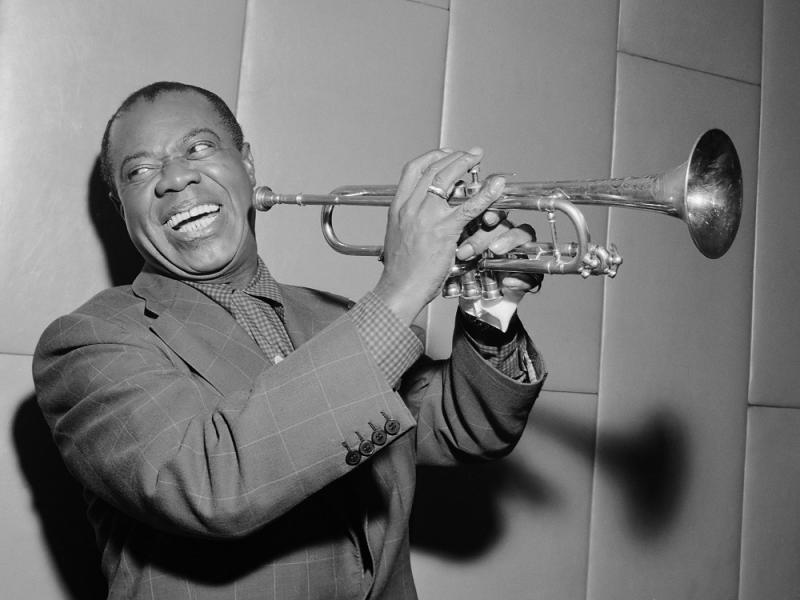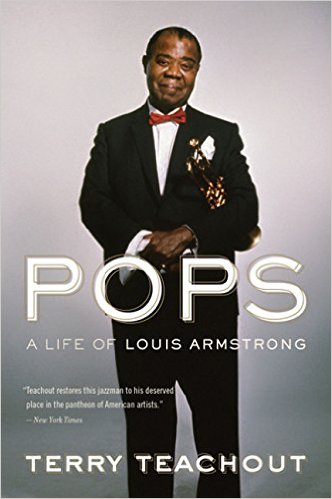Pops: The Wonderful World of Louis Armstrong | reviews, news & interviews
Pops: The Wonderful World of Louis Armstrong
Pops: The Wonderful World of Louis Armstrong
Satchmo's lifelong search for fields of green, red roses too

As Terry Teachout makes clear in this terrific biography, the world that Louis Armstrong inhabited was anything but wonderful. It was, for most of his life, both profoundly racist and astonishingly bitchy. By the late 1950s, with his 60th birthday approaching and four decades of solid success behind him, Armstrong was still forced to sleep in a gymnasium while playing in segregated North Carolina, and denied access to a public toilet in Connecticut.
At the same time, he was being reviled as a sell-out by younger black jazzers such as the bebop trumpet ace Dizzy Gillespie, who called him “a plantation character”, and dismissed by James Baldwin, leader of the so-called “Negro intellectuals”, as a purveyor of “old-time, down home crap”. He never shook off the charge that he was a grinning collaborator in white supremacism - an “Uncle Tom” - which tainted even messages of support from admirers such as Billie Holiday. “God bless Louis Armstrong, he Toms from the heart!” Holiday proclaimed, unhelpfully.
Such was the rivalrous animosity he inspired in other band leaders that one shopped him to the LAPD in 1932 for smoking his beloved marijuana – or "gage" - outside a gig, an arrest that had him briefly sent to jail. It was the way that Armstrong soared above all these brickbats that was truly wonderful.
 Born into grinding poverty, the son of a prostitute single mother in New Orleans’s Storyville district whose father absconded soon after his birth, Armstrong was an energetic self-starter. He harboured a lifelong distrust of what he saw as the fecklessness of his fellow blacks. A big influence on his early life was a local Jewish family, the Karnofskys, whose kindness, industry and domestic solidarity he greatly admired. “If it wasn’t for the nice Jewish people we would have starved many a time,” he later wrote. While in hospital at the end of his life he scrawled in a notebook, “the White Folks did everything that’s decent for me. I wish that I can boast those same words for N******.”
Born into grinding poverty, the son of a prostitute single mother in New Orleans’s Storyville district whose father absconded soon after his birth, Armstrong was an energetic self-starter. He harboured a lifelong distrust of what he saw as the fecklessness of his fellow blacks. A big influence on his early life was a local Jewish family, the Karnofskys, whose kindness, industry and domestic solidarity he greatly admired. “If it wasn’t for the nice Jewish people we would have starved many a time,” he later wrote. While in hospital at the end of his life he scrawled in a notebook, “the White Folks did everything that’s decent for me. I wish that I can boast those same words for N******.”
Armstrong discovered his talent for music around the time he was sent aged 11 to a local "Colored Waifs’ Home" for firing blanks from a pistol in public. The discipline and routines suited him. At some point he began playing the cornet – bought with a $5 loan from the Karnofskys – and at 14 he was entertaining hookers in brothels. He was handily situated to ride the wave that saw ragtime morph into jazz and left New Orleans for Chicago in 1919 where his wild soloing in Joe Oliver’s Creole Jazz Band shifted jazz on its axis, creating the vogue for instrumental improvisation.
Ten years later Armstrong was one of the biggest stars in America with a list of mould-breaking achievements. He was the first black man to star in a Hollywood movie. With mainstream success came raging controversy. Teachout is especially good at exposing the difficulties Armstrong experienced with critics and fellow musicians after he became famous. On his first tour of England in 1932 he was on the one hand hailed as an innovator – “as modern as James Joyce” - and dismissed as a circus act. The Daily Express man complained that “he looks and behaves like an untrained gorilla”. Another commentator mocked his “clean shaven hippopotamus physiognomy”.
As time went by opinion became even more polarised. Fans such as Philip Larkin lauded him as “more important than Picasso” and Le Corbusier called him “equilibrium on a tightrope”. Meanwhile a growing chorus of reviewers objected to the film roles, hit records and funny-guy stage patter. “Now he is a one-man show: comedian, jivester, and lastly musician” was a widely voiced put-down.
These jibes hurt. Armstrong was a far more shaded character than his sunny public persona let on. Teachout’s access to a previously unavailable archive of taped conversations and unpublished writings has allowed him to construct the most complete picture yet of a well studied subject. In particular he captures Armstrong’s deep ambivalence to his predicament as a black celebrity in an entertainment industry run by whites. He lamented the way that he had become “ a greater attraction among whites than my own people, a thing which has always disturbed me”.
Not that he did much about it. His passivity in handing over the management of his career to a Chicago mobster, Joe Glaser, and his fondness for manipulative wives - with whom he mysteriously never had any children – are well documented. Teachout’s key insight is his understanding that Armstrong was “ a child of his time, not ours”. As a pragmatic believer in self-reliance he was completely out of step with the political correctness which has been ingrained in the cultural discourse of black America.
Teachout retells an encounter between Armstrong and a drunken Southern redneck who marches up to inform him that he “don’t like n*****s”, to which Armstrong replies equably, “Why not, Pops?” The guy is stumped, starts to cry and the two become friends. In that act of forebearance, Teachout argues, lies the essence of Armstrong's “sunlit, hopeful art”.
- Pops: The Wonderful World of Louis Armstrong by Terry Teachout (JR Books, £20)
Explore topics
Share this article
The future of Arts Journalism
You can stop theartsdesk.com closing!
We urgently need financing to survive. Our fundraising drive has thus far raised £49,000 but we need to reach £100,000 or we will be forced to close. Please contribute here: https://gofund.me/c3f6033d
And if you can forward this information to anyone who might assist, we’d be grateful.

Subscribe to theartsdesk.com
Thank you for continuing to read our work on theartsdesk.com. For unlimited access to every article in its entirety, including our archive of more than 15,000 pieces, we're asking for £5 per month or £40 per year. We feel it's a very good deal, and hope you do too.
To take a subscription now simply click here.
And if you're looking for that extra gift for a friend or family member, why not treat them to a theartsdesk.com gift subscription?
more New music
 Music Reissues Weekly: Evie Sands - I Can’t Let Go
Diligent, treasure-packed tribute to one of Sixties’ America’s great vocal stylists
Music Reissues Weekly: Evie Sands - I Can’t Let Go
Diligent, treasure-packed tribute to one of Sixties’ America’s great vocal stylists
 'Deadbeat': Tame Impala's downbeat rave-inspired latest
Fifth album from Australian project grooves but falls flat
'Deadbeat': Tame Impala's downbeat rave-inspired latest
Fifth album from Australian project grooves but falls flat
 Heartbreak and soaring beauty on Chrissie Hynde & Pals' Duets Special
The great Pretender at her most romantic and on the form of her life
Heartbreak and soaring beauty on Chrissie Hynde & Pals' Duets Special
The great Pretender at her most romantic and on the form of her life
 The Last Dinner Party's 'From the Pyre' is as enjoyable as it is over-the-top
Musically sophisticated five-piece ramp up the excesses but remain contagiously pop
The Last Dinner Party's 'From the Pyre' is as enjoyable as it is over-the-top
Musically sophisticated five-piece ramp up the excesses but remain contagiously pop
 Moroccan Gnawa comes to Manhattan with 'Saha Gnawa'
Trance and tradition meet Afrofuturism in Manhattan
Moroccan Gnawa comes to Manhattan with 'Saha Gnawa'
Trance and tradition meet Afrofuturism in Manhattan
 Soulwax’s 'All Systems Are Lying' lays down some tasty yet gritty electro-pop
Belgian dancefloor veterans return to the fray with a dark, pop-orientated sound
Soulwax’s 'All Systems Are Lying' lays down some tasty yet gritty electro-pop
Belgian dancefloor veterans return to the fray with a dark, pop-orientated sound
 Music Reissues Weekly: Marc and the Mambas - Three Black Nights Of Little Black Bites
When Marc Almond took time out from Soft Cell
Music Reissues Weekly: Marc and the Mambas - Three Black Nights Of Little Black Bites
When Marc Almond took time out from Soft Cell
 Album: Mobb Deep - Infinite
A solid tribute to a legendary history
Album: Mobb Deep - Infinite
A solid tribute to a legendary history
 Album: Boz Scaggs - Detour
Smooth and soulful standards from an old pro
Album: Boz Scaggs - Detour
Smooth and soulful standards from an old pro
 Emily A. Sprague realises a Japanese dream on 'Cloud Time'
A set of live improvisations that drift in and out of real beauty
Emily A. Sprague realises a Japanese dream on 'Cloud Time'
A set of live improvisations that drift in and out of real beauty
 Trio Da Kali, Milton Court review - Mali masters make the ancient new
Three supreme musicians from Bamako in transcendent mood
Trio Da Kali, Milton Court review - Mali masters make the ancient new
Three supreme musicians from Bamako in transcendent mood
 Hollie Cook's 'Shy Girl' isn't heavyweight but has a summery reggae lilt
Tropical-tinted downtempo pop that's likeable if uneventful
Hollie Cook's 'Shy Girl' isn't heavyweight but has a summery reggae lilt
Tropical-tinted downtempo pop that's likeable if uneventful

Add comment